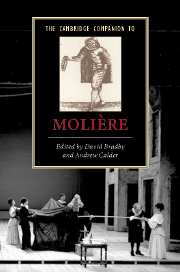Book contents
- Frontmatter
- 1 The career strategy of an actor turned playwright: 'de l’audace, encore de l’audace, toujours de l’audace’
- 2 The material conditions of Molière’s stage
- 3 The master and the mirror: Scaramouche and Molière
- 4 Molière as satirist
- 5 How (and why) not to take Molière too seriously
- 6 L’Avare or Harpagon’s masterclass in comedy
- 7 Laughter and irony in Le Misanthrope
- 8 Comédies-ballets
- 9 Le Bourgeois gentilhomme: Molière and music
- 10 Medicine and entertainment in Le Malade imaginaire
- 11 Molière and the teaching of Frenchness: Les Femmes savantes as a case study
- 12 L'École des femmes: matrimony and the laws of chance
- 13 Molière nationalised: Tartuffe on the British stage from the Restoration to the present day
- 14 Landmark twentieth-century productions of Molière: a transatlantic perspective on Molière: mise en scène and its historiography
- 15 Dom Juan the Directors’ Play
- 16 ‘Reculer pour mieux sauter’: modern experimental theatre’s debt to Molière
- Select bibliography
- Index
- Series List
5 - How (and why) not to take Molière too seriously
Published online by Cambridge University Press: 28 March 2007
- Frontmatter
- 1 The career strategy of an actor turned playwright: 'de l’audace, encore de l’audace, toujours de l’audace’
- 2 The material conditions of Molière’s stage
- 3 The master and the mirror: Scaramouche and Molière
- 4 Molière as satirist
- 5 How (and why) not to take Molière too seriously
- 6 L’Avare or Harpagon’s masterclass in comedy
- 7 Laughter and irony in Le Misanthrope
- 8 Comédies-ballets
- 9 Le Bourgeois gentilhomme: Molière and music
- 10 Medicine and entertainment in Le Malade imaginaire
- 11 Molière and the teaching of Frenchness: Les Femmes savantes as a case study
- 12 L'École des femmes: matrimony and the laws of chance
- 13 Molière nationalised: Tartuffe on the British stage from the Restoration to the present day
- 14 Landmark twentieth-century productions of Molière: a transatlantic perspective on Molière: mise en scène and its historiography
- 15 Dom Juan the Directors’ Play
- 16 ‘Reculer pour mieux sauter’: modern experimental theatre’s debt to Molière
- Select bibliography
- Index
- Series List
Summary
The difficulty no doubt arises in part from Molière himself. If a writer of comedies writes in addition about the nature and purpose of comedy, we are likely to attend to what he says; and Molière does this both in a range of liminary pieces and, most engagingly, in two metatheatrical plays, La Critique de L'École des femmes and L'Impromptu de Versailles. The status of utterance in the two types of text is clearly subtly different, and it should certainly not be assumed that everything spoken by Molière's apparent mouthpieces can be taken at face value. But then, it is not clear that everything written by Molière can either.
La Critique de L'École des femmes (hereafter La Critique) is a one-act play, in which certain of the objections to, amongst other things, the use of sexual innuendo in the play it defends (L'École des femmes) are addressed and ridiculed by the urbane and discriminating figures of Dorante and Uranie. One of the episodes at issue concerns the young and naive Agnès's confession to her possessive guardian and would-be husband Arnolphe that her clandestine suitor Horace, in the course of a previous encounter, had stolen her ribbon (II, 5). This confession scene is exploited comically, however, by Agnès holding back the crucial noun which will reveal what it was that was taken from her.
- Type
- Chapter
- Information
- The Cambridge Companion to Moliere , pp. 71 - 82Publisher: Cambridge University PressPrint publication year: 2006



